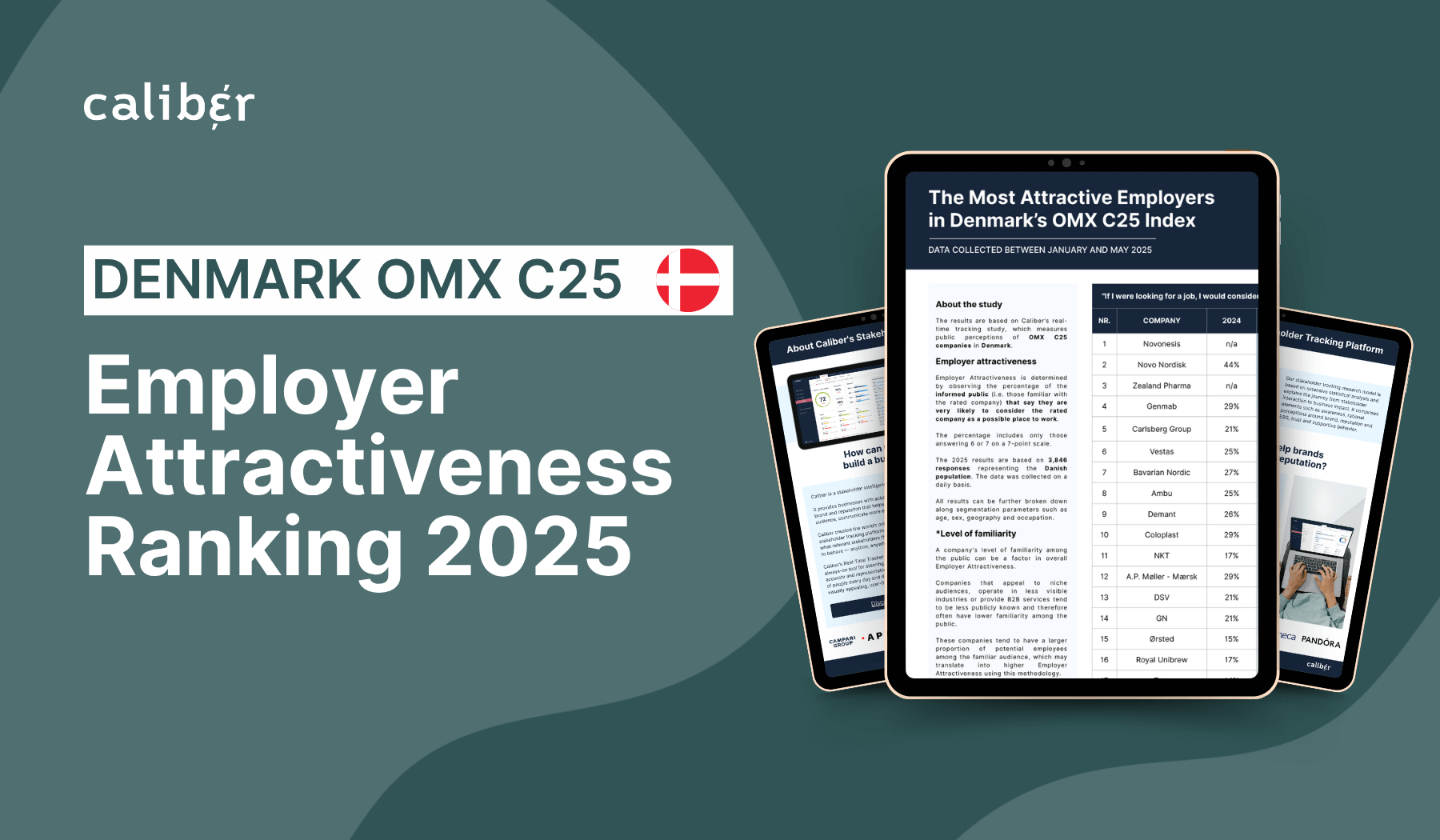

It has been an exciting second quarter of 2019 here in Denmark. From climate marches to electing a new government, a lot has happened over the past few months – and the same goes for Denmark’s Top 100 most prominent companies.
Overall, the average Trust and Like Score for the Top 100 is down by almost one point from a score of 63.8 in Q1 to 62.9 in Q2.
Interestingly, nearly a quarter of the companies in Denmark’s Top 100 saw a significant decrease in their reputation score, yet only a tenth saw a significant increase. Let’s dig a bit deeper.
It appears e-Boks has done it again. Our Q1 2019 results showed the digital post provider suffered a 6.8-point fall, which left us wondering how the company will fare over the next few quarters.
Despite a rough start in Q2 with a technical crash that temporarily left many users unable to log into their accounts and an advertising campaign from VisitDenmark that sparked a data privacy debate, e-Boks is once again Denmark’s favorite company.
Perhaps the 5.3-point increase in perceptions came following the news that Danes might not have to be checking two mailboxes after a complaint from e-Boks annulled the Netcompany contract.
Another possibility could very well be due to the quick crisis response during the technical crash and VisitDenmark’s mailings – serving as a reminder that reputation isn’t built solely on success.
Following e-Boks’ rise, Lego moves down to 2nd place with a score of 78.4 followed by Rema 1000 once again in 3rd with a stable score of 76.7 points.
Grundfos claims 4th place with a score of 74.4 while the 5th place is shared among Novo Nordisk, Georg Jensen, and SuperBrugsen with less than a 0.1-point difference in scores between them.
Unilever, known for its dedication to a sustainable future, came under pressure from Greenpeace last quarter over single-use plastics. During this time, the consumer goods giant was amongst our top fallers with an 8.5-point drop in perceptions over Q1.
However, it appears that true commitment to the cause could be the reason behind the company’s 7.8-point bounce-back in Q2 – making Unilever Q2’s top riser. To help bridge the gap between consumer expectations and product offerings, Unilever implemented a recycling experiment in the small Danish town of Mogenstrup.
The goal of the study was to reduce single-use plastic as well as improve the current recycling system here in Denmark. It seems Unilever isn’t only walking the talk but encouraging others to do so as well, following CEO Alan Jope’s speech in Cannes urging brands to use purpose to drive positive change.
Nestlé seems to have gone through a similar journey after also suffering from scrutiny by Greenpeace last quarter for lacking transparency, clear targets, and significant investment in terms of sustainability.
The company’s 7.3-point rise in Q2 may be a result of the company’s vow to end deforestation, or it may have more to do with the launch of new products in Denmark – like new Nescafe varieties, green chocolate, and plant-based hamburgers. In any case, this rise represents more than a full recovery from the reputational dip it incurred in Q1.
Last quarter, Saxo Bank was another one of our top fallers with an 8.5-point drop, but it now moves ahead to become one of this quarter’s top risers with a 7.3-point rise in reputation score.
While still in 97th place, Saxo’s latest onboarding strategy could be what’s helping to boost perceptions. Using an automation process, the bank was able to reduce customer onboarding from 5 days to one hour – leading to a record month in April of 18,000 customers compared to a previous average of 1,500 a month. It will be interesting to see how the company adjusts – both in terms of perceptions and corporate culture.
Last quarter, Royal Unibrew and Carlsberg had only a 0.2-point difference in score. However, it appears things may be starting to go flat at Carlsberg after a 9.8-point fall in its reputation score leaves Royal Unibrew in the lead.
This is surprising given the hype surrounding the new ‘snap-pack’ toted for its environmental friendliness – which led to 19% growth in sales over Q1 alone.
However, it appears that some feel the snap-pack is more talk than walk, with comments on Danish media from consumers saying that they had trouble separating the cans and calling into question the environmental claims of the new packaging due to the small pieces of glue that can fall off and be eaten by wildlife. Is Carlsberg’s snap-pack snapping back?
Once renowned for its charm bracelets, jewelry giant Pandora has had a rough couple of years. However, the recent 9.5-point fall over Q2 leaves the company at its lowest reputation score yet.
A lot changed at the beginning of the quarter with the retirement of CEO Jeremy Schwartz and a new board chairman. The company hasn’t received much positive publicity as of late. With stock repurchases and layoffs, it appears both Pandora’s sales and reputation are on the decline.
A rather expected significant drop in Q2 was Scandinavian Airlines (SAS) following the pilot strike at the beginning of the quarter. Though the airline worked to help customers rebook flights, the company still suffered from an unprecedented 9.4-point fall in Q2.
Interestingly, our 2018 UK reputation ranking found Easyjet only suffered a 5.4-point drop after the 2018 strikes and cancellations. While SAS is still more than a few points ahead of EasyJet, it appears with its reputation comes increased expectations and responsibility.
This year, despite the typical “spring optimism” effect, the Danish public appears to be more critical of companies in Q2 with nearly a full-point drop in the average Trust and Like Score, though some companies have clearly bounced back from previous reputational declines.
Perhaps given the uncertainty of a new government, consumers are holding companies to account more than before.
It remains to be seen whether this trend continues as the summer draws to a close and politics go back to business-as-usual mode. We’ll be back in October with Q3 results to find out!

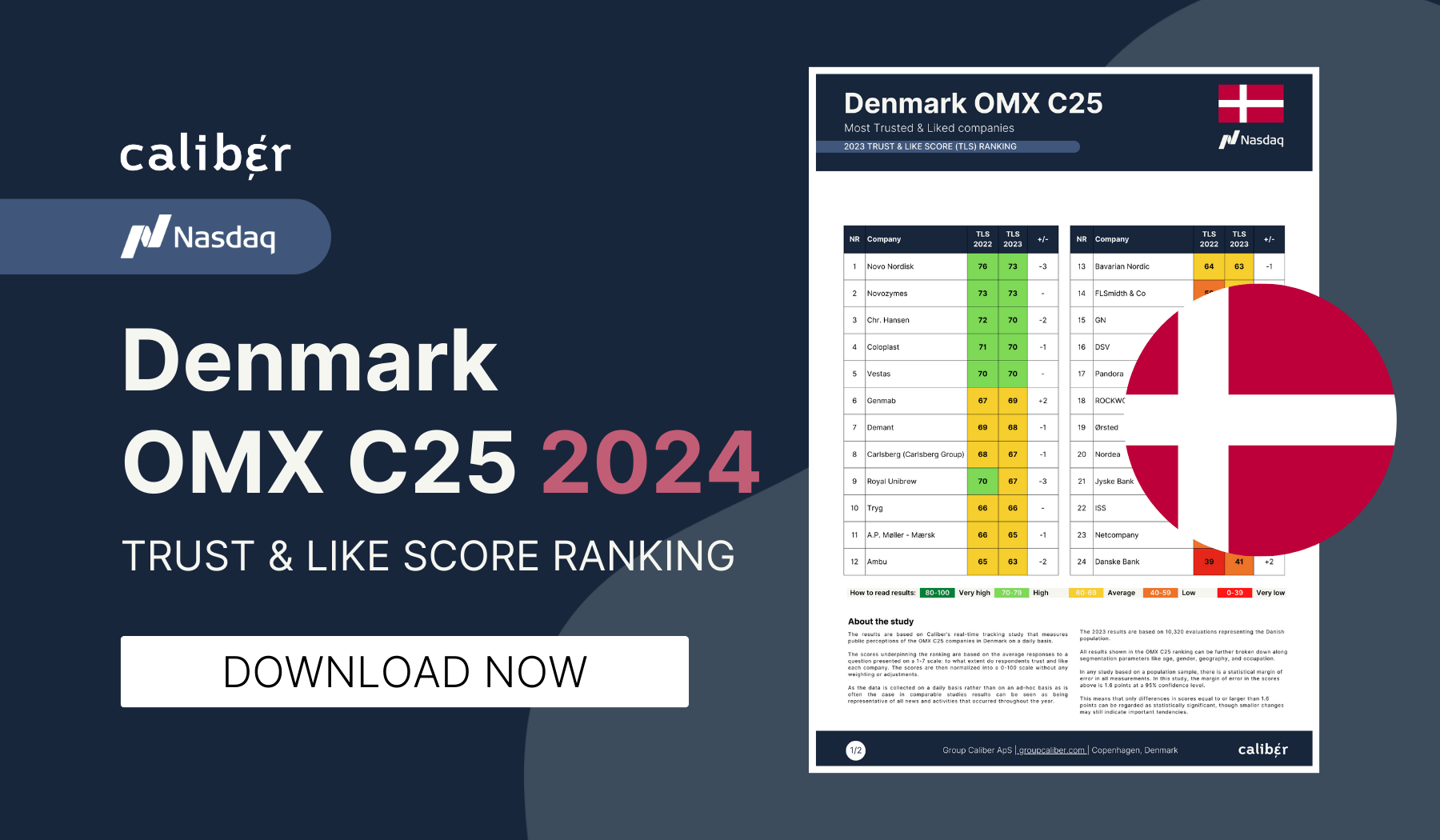
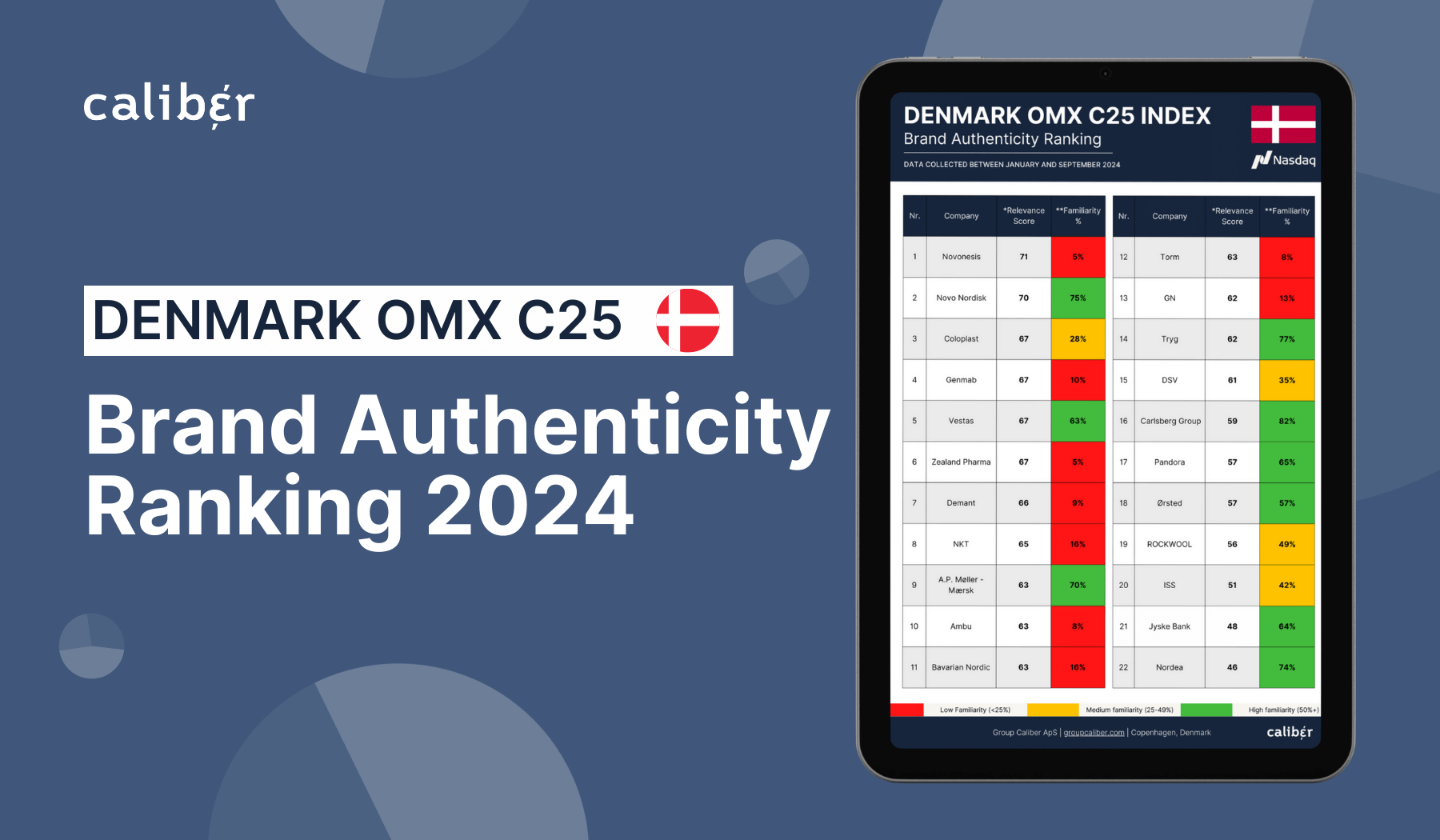
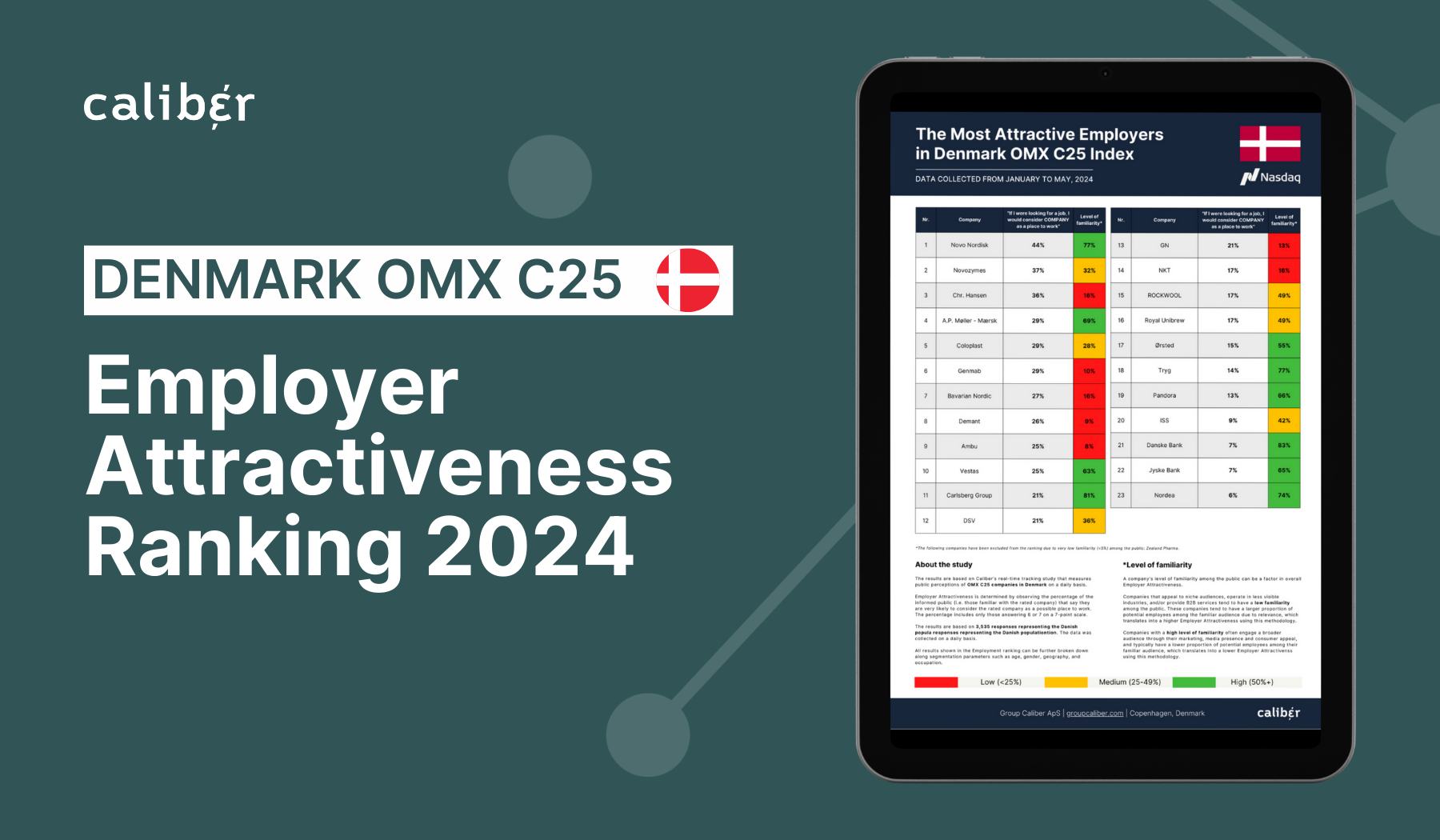
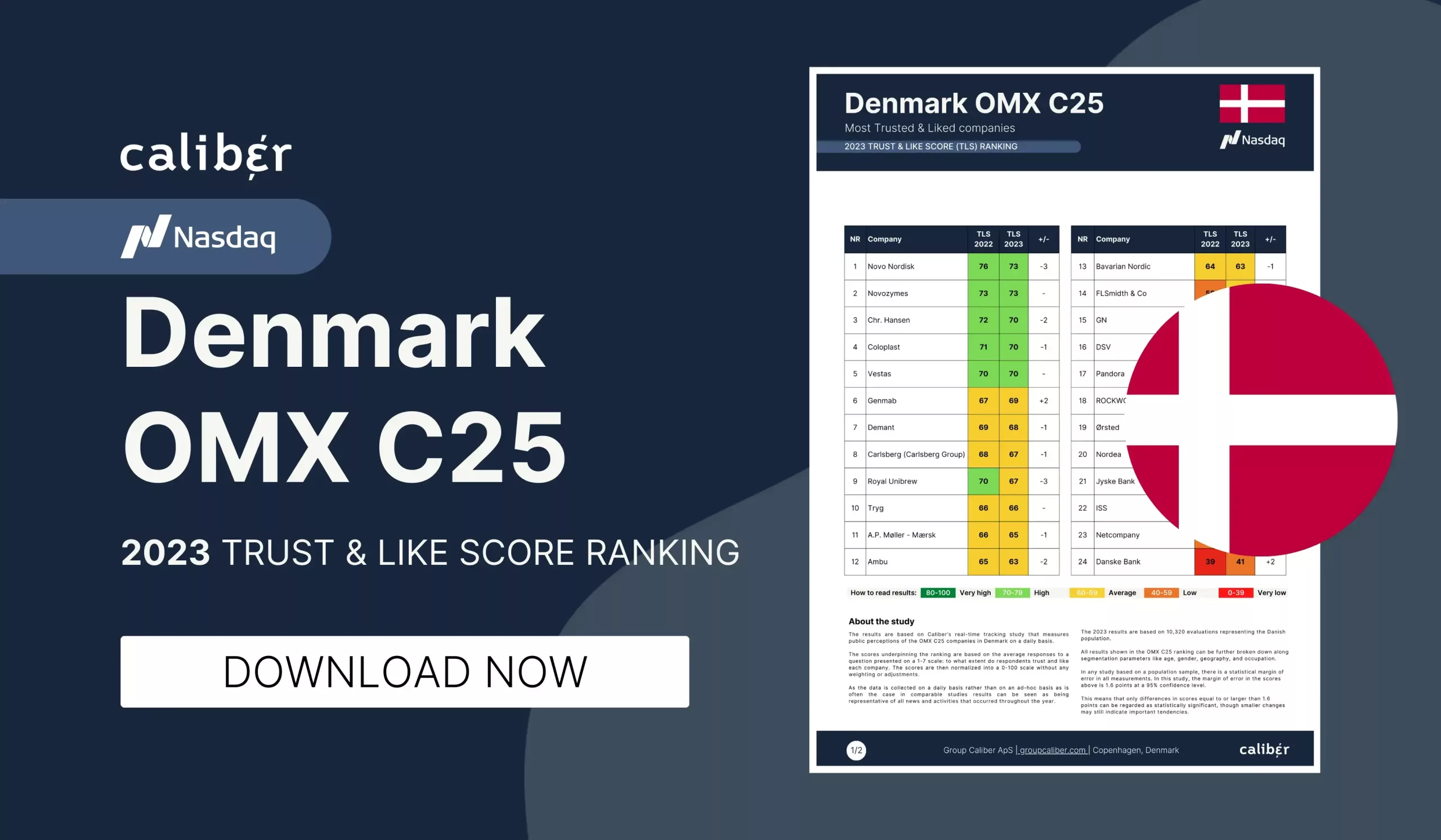

© 2024 Group Caliber | All Rights Reserved | VAT: DK39314320